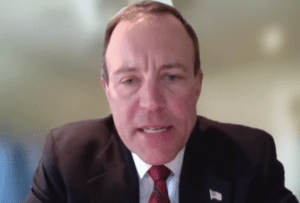Who is a member?
Our members are the local governments of Massachusetts and their elected and appointed leadership.

Scott Bosworth, the Department of Transportation’s undersecretary and chief strategy officer, discusses the administration’s infrastructure bond bill during the April 20 virtual meeting of the Local Government Advisory Commission.
The Joint Committee on Transportation has extended the time period for considering Gov. Charlie Baker’s $9.7 billion infrastructure bond bill until May 6.
The governor filed An Act Relative to Massachusetts’s Transportation Resources and Climate, or MassTRAC, on March 17. The bill was referred to the Transportation Committee, which held a hearing on April 12. The MMA submitted written testimony expressing support for the bill.
In addition to investing in existing state programs, MassTRAC includes required state matching funds to compete for and capitalize on investment opportunities provided by the federal Bipartisan Infrastructure Law.
The $1.2 trillion Bipartisan Infrastructure Law provides discretionary funding through formula-based allocations and more than $110 billion in competitive grants to be overseen by the U.S. Department of Transportation. These competitive grants will be distributed over five years and are available to all states, territories and tribal lands.
Gov. Baker said the MassTRAC bill would provide authorizations necessary to ensure the Commonwealth is well-positioned to win the federal grants.
MassTRAC includes:
• $2.85 billion in BIL-related authorizations for formula-based funding
• $3.55 billion in BIL-related authorizations for discretionary grants
• $3.3 billion in non-BIL authorizations for capital investment programs
Of the total, $4.1 billion is federal aid and $5.6 billion is state-funded authorizations required for federal aid matching and non-BIL program investment.
The $3.3 billion in capital investments would support capital programs of the Massachusetts Department of Transportation and the Massachusetts Bay Transportation Authority through 2026. The funds would be used to modernize the state’s transportation system, with a focus on transportation network improvements and infrastructure geared toward climate change mitigation, resiliency, equity and safety for all users, particularly cyclists and pedestrians. Investments would include improvements to non-interstate highways; funding for several municipal grant programs, including Complete Streets, Small Municipal Bridge, Municipal Pavement, and Shared Streets and Spaces; and modernization of the MBTA.
The bill would also authorize the use of blue flashing safety lights at construction sites, and includes provisions to enable the MassDOT and the MBTA to use certain project procurement and delivery tools that could speed the implementation of federally funded projects, as well as regular project delivery.
• View the administration’s April 20 presentation to the MMA on MassTRAC